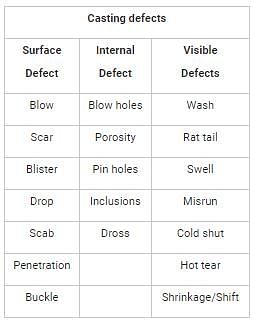Mechanical Engineering Exam > Mechanical Engineering Questions > Which of the following is not a casting defec...
Start Learning for Free
Which of the following is not a casting defect?
- a)hot tear
- b)blow hole
- c)scab
- d)decarburization
Correct answer is option 'D'. Can you explain this answer?
| FREE This question is part of | Download PDF Attempt this Test |
Verified Answer
Which of the following is not a casting defect?a)hot tearb)blow holec)...
A casting defect is an irregularity in the metal casting process that is undesired.
Classification of casting defects is given as:

Most Upvoted Answer
Which of the following is not a casting defect?a)hot tearb)blow holec)...
Explanation:
In casting, defects can occur due to various reasons such as improper design, material selection, process parameters, etc. These defects can affect the quality and integrity of the final product. The given options are all common types of casting defects, except for decarburization.
Decarburization:
Decarburization is not a casting defect but rather a surface condition that occurs during the heat treatment process. It refers to the loss of carbon content from the surface layer of a material, typically steel, due to exposure to high temperatures in an oxidizing atmosphere. This results in a decrease in the hardness and strength of the material.
Other Casting Defects:
1. Hot Tear:
Hot tear or hot cracking is a defect that occurs due to the presence of high tensile stresses during solidification. It is characterized by cracks or tears in the casting, usually in the area of highest thermal stress. This defect is more common in metals with low ductility.
2. Blow Hole:
A blow hole is a type of porosity defect that occurs due to the entrapment of gases during the solidification process. These gases can be released from the molten metal as it solidifies, resulting in voids or cavities in the casting. Blow holes can affect the mechanical properties and surface finish of the final product.
3. Scab:
Scab defects occur when the sand mold or core surface breaks away and becomes embedded in the casting. This can happen due to excessive moisture content in the mold or poor sand compaction. Scabs can result in surface roughness and reduced dimensional accuracy.
In summary, while hot tear, blow hole, and scab are common casting defects that can affect the quality and integrity of the final product, decarburization is not a casting defect but rather a surface condition that occurs during heat treatment.
In casting, defects can occur due to various reasons such as improper design, material selection, process parameters, etc. These defects can affect the quality and integrity of the final product. The given options are all common types of casting defects, except for decarburization.
Decarburization:
Decarburization is not a casting defect but rather a surface condition that occurs during the heat treatment process. It refers to the loss of carbon content from the surface layer of a material, typically steel, due to exposure to high temperatures in an oxidizing atmosphere. This results in a decrease in the hardness and strength of the material.
Other Casting Defects:
1. Hot Tear:
Hot tear or hot cracking is a defect that occurs due to the presence of high tensile stresses during solidification. It is characterized by cracks or tears in the casting, usually in the area of highest thermal stress. This defect is more common in metals with low ductility.
2. Blow Hole:
A blow hole is a type of porosity defect that occurs due to the entrapment of gases during the solidification process. These gases can be released from the molten metal as it solidifies, resulting in voids or cavities in the casting. Blow holes can affect the mechanical properties and surface finish of the final product.
3. Scab:
Scab defects occur when the sand mold or core surface breaks away and becomes embedded in the casting. This can happen due to excessive moisture content in the mold or poor sand compaction. Scabs can result in surface roughness and reduced dimensional accuracy.
In summary, while hot tear, blow hole, and scab are common casting defects that can affect the quality and integrity of the final product, decarburization is not a casting defect but rather a surface condition that occurs during heat treatment.
Attention Mechanical Engineering Students!
To make sure you are not studying endlessly, EduRev has designed Mechanical Engineering study material, with Structured Courses, Videos, & Test Series. Plus get personalized analysis, doubt solving and improvement plans to achieve a great score in Mechanical Engineering.

|
Explore Courses for Mechanical Engineering exam
|

|
Which of the following is not a casting defect?a)hot tearb)blow holec)scabd)decarburizationCorrect answer is option 'D'. Can you explain this answer?
Question Description
Which of the following is not a casting defect?a)hot tearb)blow holec)scabd)decarburizationCorrect answer is option 'D'. Can you explain this answer? for Mechanical Engineering 2024 is part of Mechanical Engineering preparation. The Question and answers have been prepared according to the Mechanical Engineering exam syllabus. Information about Which of the following is not a casting defect?a)hot tearb)blow holec)scabd)decarburizationCorrect answer is option 'D'. Can you explain this answer? covers all topics & solutions for Mechanical Engineering 2024 Exam. Find important definitions, questions, meanings, examples, exercises and tests below for Which of the following is not a casting defect?a)hot tearb)blow holec)scabd)decarburizationCorrect answer is option 'D'. Can you explain this answer?.
Which of the following is not a casting defect?a)hot tearb)blow holec)scabd)decarburizationCorrect answer is option 'D'. Can you explain this answer? for Mechanical Engineering 2024 is part of Mechanical Engineering preparation. The Question and answers have been prepared according to the Mechanical Engineering exam syllabus. Information about Which of the following is not a casting defect?a)hot tearb)blow holec)scabd)decarburizationCorrect answer is option 'D'. Can you explain this answer? covers all topics & solutions for Mechanical Engineering 2024 Exam. Find important definitions, questions, meanings, examples, exercises and tests below for Which of the following is not a casting defect?a)hot tearb)blow holec)scabd)decarburizationCorrect answer is option 'D'. Can you explain this answer?.
Solutions for Which of the following is not a casting defect?a)hot tearb)blow holec)scabd)decarburizationCorrect answer is option 'D'. Can you explain this answer? in English & in Hindi are available as part of our courses for Mechanical Engineering.
Download more important topics, notes, lectures and mock test series for Mechanical Engineering Exam by signing up for free.
Here you can find the meaning of Which of the following is not a casting defect?a)hot tearb)blow holec)scabd)decarburizationCorrect answer is option 'D'. Can you explain this answer? defined & explained in the simplest way possible. Besides giving the explanation of
Which of the following is not a casting defect?a)hot tearb)blow holec)scabd)decarburizationCorrect answer is option 'D'. Can you explain this answer?, a detailed solution for Which of the following is not a casting defect?a)hot tearb)blow holec)scabd)decarburizationCorrect answer is option 'D'. Can you explain this answer? has been provided alongside types of Which of the following is not a casting defect?a)hot tearb)blow holec)scabd)decarburizationCorrect answer is option 'D'. Can you explain this answer? theory, EduRev gives you an
ample number of questions to practice Which of the following is not a casting defect?a)hot tearb)blow holec)scabd)decarburizationCorrect answer is option 'D'. Can you explain this answer? tests, examples and also practice Mechanical Engineering tests.

|
Explore Courses for Mechanical Engineering exam
|

|
Suggested Free Tests
Signup for Free!
Signup to see your scores go up within 7 days! Learn & Practice with 1000+ FREE Notes, Videos & Tests.
























